#Alexis Mardas
Photo
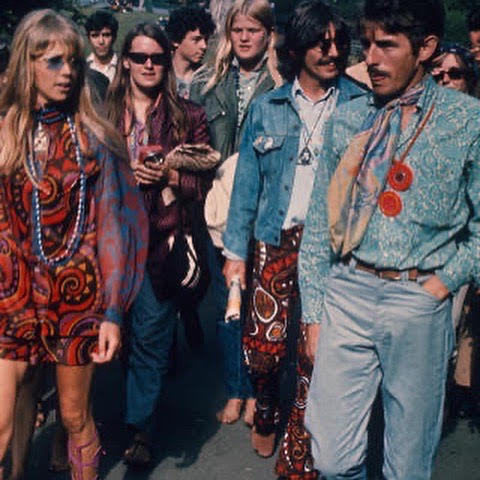

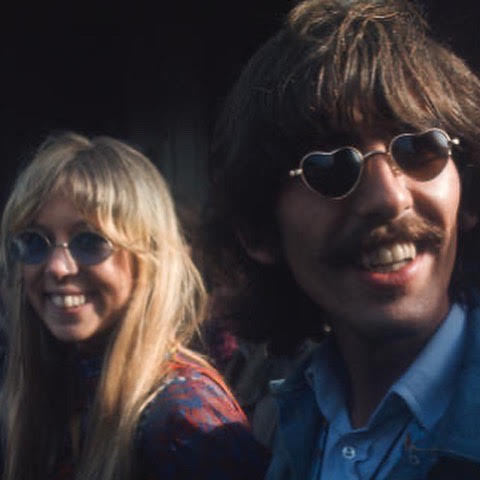



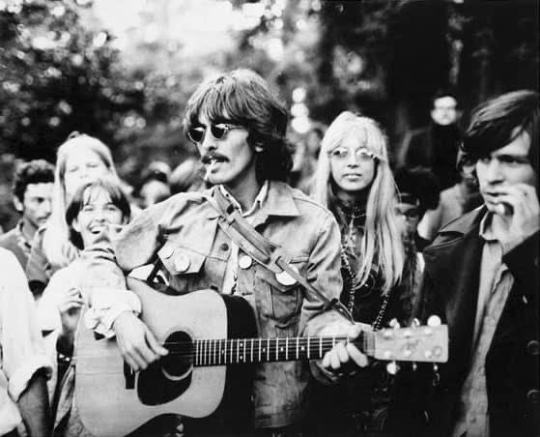
George Harrison, Pattie Boyd, Derek Taylor, and "Magic" Alex in Haight-Ashbury on 7 August 1967. Photos by Grant Jacobs, Gene Anthony, AP Photo, Bettmann via Getty Images.
George's Haight-Ashbury turning point visit, 55 years later; post 1 of 3.
“Everywhere we went, people were smiling and, you know, sitting on lawns ‘drinking tea,’ you know; festivals of music... I mean, that Summer of Love, a lot of that was bulls***, really, it was all what the press were saying, but there was definitely a vibe.” - George Harrison, The Beatles Anthology (2000)
“I went to Haight-Ashbury and it was totally unlike the idea I had in my mind. I thought it would be full of artistic hippies crafting clothes, jewelry, artwork, all that sort of stuff. But when I got there, it was like the Bowery. It was a lot of dropouts who were lost. And they’d had so many different drugs that they didn’t know which way they were going. As they say: if you don’t know where you’re going, any road will take you there. It turned me round totally. I thought, well, that’s it for me. I don’t really want to be a person that they look up to. I just thought I had to get out of this. I was very disappointed, really.” - George Harrison, I Me Mine - The Extended Edition
“On the way, Derek produced a tab [of LSD]. Would we like some? Since we were going to Haight-Ashbury, it seemed silly not to.
[…] We got out of the car, the acid kicked in and everything was just whoah, psychedelic and very… I mean, it was just completely fine. We went into a shop and noticed that all these people were following us. They had recognized George as we walked past them in the street, then turned to follow us. One minuter there were five, then ten, twenty, thirty and forty people being us. I could hear them saying, ‘The Beatles are here, the Beatles are in town!’
We were expecting Haight-Ashbury to be special, a creative and artistic place, filled with Beautiful People, but it was horrible — full of ghastly drop-outs, bums and spotty youths, all out of their brains. Everybody looked stoned — even mothers and babies — and they were so close behind us they were treading on the backs of our heels. It got to the point where we couldn’t stop for fear of being trampled. Then somebody said, ‘Let’s go to Hippie Hill,’ and we crossed the road, hoping the lights were red, and went into a park. Then somebody said, ‘Let’s sit down here,’ and we all sat down n the grass, our retinue facing us, as if we were on stage. They looked at us expectantly — as if George was some kind of Messiah.
We were so high, and then the inevitable happened: a guitar emerged from the crowd and I could see it being passed to the front by outstretched arms. I thought, Oh, God, poor George, this is a nightmare. Finally the guitar was handed to him. I had the feeling that they’d listened to the Beatles’ records, analyzed them, learnt what they’d thought they should learn, and taken every drug they’d thought the Beatles were singing about. Now they wanted to know where to go next. And George was there, obviously, to give them the answer. Pressure.
George was so cool. He said, ‘This is G, this is E, this is D,’ and showed them a few chords, then handed back the guitar and said, ‘Sorry, man, we’ve got to go now.’ He didn’t sing — he couldn’t have: he was flying. We all were. I was surprised he could even do that.
Anyway, we got up and walked back towards the limo, at which point I heard a little voice say, ‘Hey, George, do you want some STP?’
George turned around and said, ‘No, thanks, I’m cool, man.’
Then the bloke turned round and said to the others, ‘George Harrison turned me down.’
And they went, ‘No!’
And then the crowd became faintly hostile. We sensed it because when you’re that high you’re very aware of vibes, and we were walking faster and faster, and they were following.
When we saw the limo, we ran across the road and jumped in, and they ran after us and started rocking the car, and the windows were full of these faces, flattened against the glass, looking at us.” - Pattie Boyd, Wonderful Tonight (2007)
“It made me realize: 'This is not it.’ And that’s when I really went for the meditation.” - George Harrison, The Beatles Anthology (2000) (x)
#George Harrison#Pattie Boyd#Derek Taylor#Alexis Mardas#1960s#quote#quotes about George#quotes by George#Harrison spirituality#ghhaightashbury55#7 August 1967#fits queue like a glove
100 notes
·
View notes
Text
youtube
Alexis Mardas (Magic Alex) appears on a Greek Late Night Show "Arga" in 1994.
#can i say something#Magic Alex#Alexis Mardas#Yannis Alexis Mardas#videos#Arga#which means 'late'#happy to help#translation pending.....need to consult the relatives#Youtube
3 notes
·
View notes
Text
Apple promotional film, August 1968


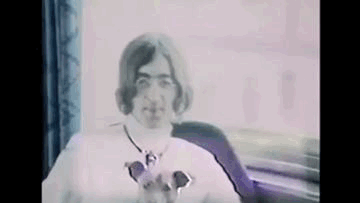




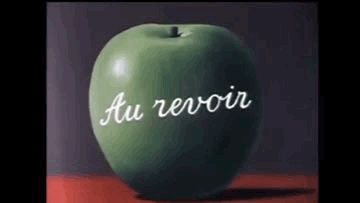
15 notes
·
View notes
Text

Jane Asher, Paul McCartney and Yanni Alexis Mardas (Magic Alex - Inventor)
#jane asher#paul mccartney#yanni alexis mardas#magic alex#actress#musician#inventor#music#rock#musica#rock music#singer#rock singer#the beatles#rock & roll#psychedelic rock#classic rock#flowers generation#age of aquarius
141 notes
·
View notes
Text
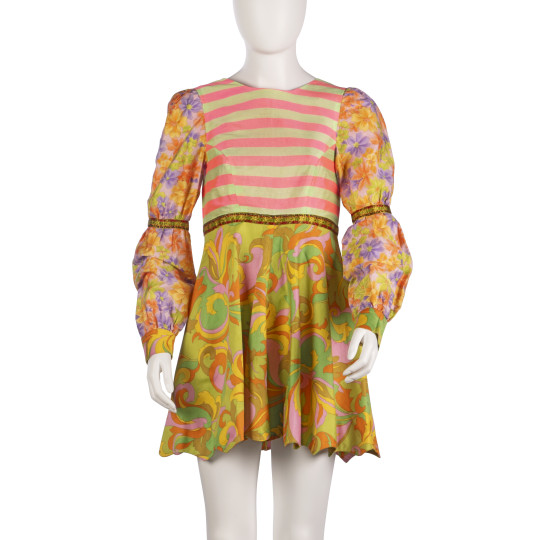


Dress Worn by Pattie Boyd for a flight from London Heathrow to Los Angeles with George Harrison, Neil Aspinall and Alexis 'Magic Alex' Mardas on 1 August 1967
Designed by The Fool
1967
Christie's: The Pattie Boyd Collection (Lot 11)
#dress#fashion history#vintage fashion#pattie boyd#george harrison#the fool#1960s#1967#20th century#cotton#british#united kingdom#floral#orange#green#pink#christie's
199 notes
·
View notes
Text
Alexis "Magic Alex" Mardas, who gave us nearly seven hours of his never-before-told experience with the Beatles and Maharishi - I've always been excited about these seven hours, so Magic Alex interview is next and I hope there will be a bit more to it than there was to Cyn's.
Stories I'm looking out for are definitely the violent Greek withdrawal, that gets repeated in other books frequently.
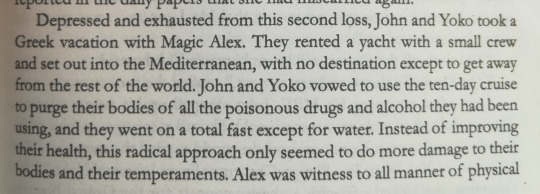

And all the other drug stories too, I guess.
If maybe he is the one who came up with the mid-flight-confession story that wasn’t in Cynthia’s interview.
His account of what happened in India and with Maharishi.
Just his take on the relationships with other people than John. Because everybody speaks so badly of him but looking at it from the outside he did seem to be well integrated.
11 notes
·
View notes
Text
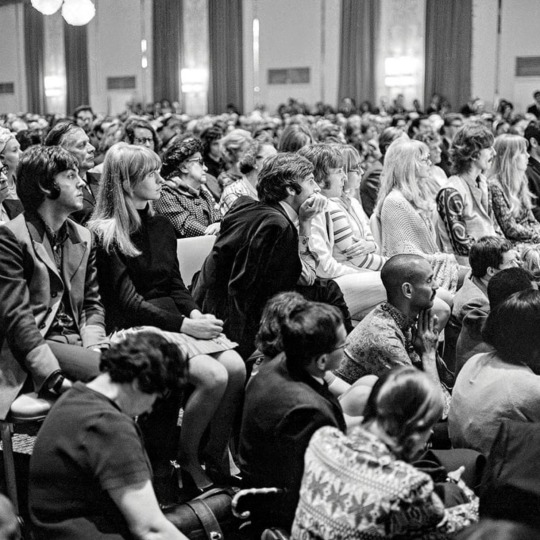
Via @thevincentvigilcollection on Instagram🌟
With the success of 1967 ( Penny Lane/Strawberry Fields Forever, Set Peppers Lonely Hearts Club Band and All You Need Is Love), in an effort to expand their consciousness🌺
The Beatles retreat to Bangor, Wales, and Maharishi Mahesh Yogi, August 24, 1967🌻
The Beatles, , along with Cynthia Lennon, Pattie Harrison, her sister Jenny, Alexis Mardas, Mick Jagger and Marianne Faithfull, embark upon a 10-day conference on Transcendental Meditation🌸🌻🌺🍀🌹🌼
Manager, Brian Epstein, had previously agreed to travel to Bangor after the August Bank Holiday. He to wanted to reach enlightenment, especially after the death of his father on July 17, 1967🌟
It was not to be!🌟
Epstein, would accidentally die of a barbiturate overdose. It was a definite turning point for the lads🌟
Vintage transparency and 35mm negative🌟
© Vincent Vigil🌟
Special thanks to Michael and Tess at Giant Photo Service, San Diego🌟
#60s icons#girlsofthesixties#60s couples#60s models#my sweet george#pattie boyd#paul mccartney#the beatles wives#john lennon#george harrison#cynthia lennon#jane asher#jenny boyd#1967
7 notes
·
View notes
Text
THE FALL AND FALL OF APPLE CORPS
“By 1967, the Beatles’ wealth had grown exponentially due to sold-out concerts and record royalties. Yet British income tax laws prescribed that any income greater than £2,000 would be taxed at higher rates in proportion to the total amount of income. In an attempt to liberate the Beatles from their tax burden, the band’s accountant Harry Pinsker advised that setting up a new company would help offset their tax liability.
Pinsker served as the Beatles’ accountant as soon as they signed Brian Epstein on as their manager in 1962. For years Pinsker utilized his expertise to conserve the band’s assets and, more importantly, to protect the boys from their profligacy. The evasive tax maneuver Pinsker suggested in 1967 had the Beatles reinvest their earnings in a business; this way, instead of being subjected to income tax, their earnings were filtered through a business and thus only subject to corporation tax, which was much lower. Using this strategy, Lennon, McCartney, Harrison, and Starr could even reclaim their personal expenses by disguising them as company expenses. When asked about his role in the creation of Apple Corps years later, Pinsker simply stated that the company was just a way to help four “scruffy boys who didn’t want to pay tax.”
Under Pinsker’s counsel, Epstein laid the foundations of a new Beatles company in April 1967. Originally named The Beatles & Company, the new enterprise was designed to be governed by each of the Beatles and Epstein. In theory, The Beatles & Company was poised to serve its purpose and save the band’s income from British taxes. However, the sudden death of Epstein on August 27, 1967, quickly skewed any chance of the new Beatles company serving its original purpose.
[…]
By the time Epstein fulfilled his promise [to turn the Beatles into a worldwide phenomenon] and the Beatles had their first string of number one hits, they placed so much faith in Epstein that Lennon, McCartney, Harrison, and Starr signed off on whatever contracts he slid under their pens without even reading them. This trusting relationship eventually morphed into a dangerous dependence as the band’s career progressed. The boys’ tendency to sign first, read never, increasingly isolated them from the sensitive business aspects of their band. So when Pinsker proposed that the Beatles form a company to manage their finances and counteract their hefty income tax, Epstein took care of the details as usual. Epstein’s tragic overdose in the midst of plans for The Beatles & Company immediately postponed its opening and, on a larger scale, left the band without any business guidance. Lennon, McCartney, Harrison, and Starr were now without the insulation that Epstein provided from the ravenous entertainment industry. Perhaps even more dangerous, the Fab Four had no one to say “no” to their self- proclaimed great ideas.
A few months after Epstein’s death, the Beatles revisited the idea of opening their own company, but this time no idea was a bad idea. The Beatles & Company was renamed Apple Corps, and the company’s fields of interest were significantly expanded beyond their original scope. Without Epstein to reign in the Beatles’ non-stop creativity, every new avenue they could think of was brought to life through Apple Corps, and the original intent of offsetting taxes slowly diminished. This led to the creation of divisions within Apple Corps that the Beatles had no practical experience in, including Apple Tailoring, Apple Retail, and Apple Electronics. The electronics division was by far the most expensive and simultaneously least profitable investment within Apple Corps. Alexis Mardas, or “Magic Alex” as Lennon nicknamed him, was placed in charge of inventions in Apple Electronics.
[…]
Clearly part of the appeal of investing in Apple Electronics was the optimism surrounding the growth of electronics and technology in general. But unfortunately for the Beatles’ money, advancements in these fields could only be brought about by someone competent enough to do so; Mardas certainly was not that someone. By the time his involvement with Apple Corps came to an end in 1969, his subpar inventions made no headway in the electronics market but still cost the Beatles over £300,000 (the modern day equivalent of approximately £3,000,000). Yet the financial losses at Apple Electronics proved only to be the tip of a very expensive iceberg.
First-hand accounts of former Apple Corps employees, including secretaries, accountants, and assistants, all construct a singular, clear picture of what Apple Corps managed to accomplish upon opening: nothing. The company’s inability to answer fundamental questions – who are we, what are we doing, and where is this all headed? – meant that its employees went into work every day directionless and failed to accomplish anything significant for the company. For instance, in the 2017 Apple Corps documentary The Beatles, Hippies, and Hell’s Angels by Ben Lewis, a former secretary of Apple Corps recalled seeing a man at work every single day that sat atop a filing cabinet doodling pictures of penises until it was time for all the employees to leave. Fortunately, whoever this Michelangelo was, his work ethic made him an outlier amongst the other Apple Corps employees, but what they did from day to day did not necessarily offer significant contributions either.
A typical day at Apple Corps began with chardonnay and cigarettes being served to secretaries and “Apple scruffs” by girls who would wait in reception at Apple Corps to get even a glimpse of the Beatles. When it came time for lunch, enough drugs would go around to ensure that everybody in the office was at least glassy eyed. As if drugs and alcohol being used during the workday was not bad enough, Apple Corps paid for the alcohol, which meant that Lennon, McCartney, Harrison, and Starr were personally paying the massive £600 liquor bill each month. On top of these party favors, employees spent hundreds of thousands of pounds on almost a monthly basis decorating their offices and the building with extravagant, overly ornate furniture. Even Neil Aspinall, the Beatles’ former road manager turned head of Apple Corps, thought it was entertaining to go overboard furnishing the boys’ offices and purchased four enormous “gold hand-tooled, leather top” chairs for them. But the unnecessary expenditures did not stop at just alcohol and furniture; unauthorized flights from London to Paris and America, coupled with international phone calls dialed by non-employees that just wandered into the building, all contributed to the chaos of Apple. The phone calls got so out of control at one point that Apple Corps was billed £4,000 for a single month. These mammoth costs were left unchecked for months. As a result, the company was hemorrhaging money from every angle possible, and because its profits were essentially non-existent, these costs were paid month after month by the Beatles, with no profits from the company to compensate them. By September 1968, things were so chaotic at Apple Corps that its chief financial advisor resigned, stating in his resignation letter that his departure was due to the “slipshod manner in which the company was being managed.” Soon after, the company’s second and only remaining accountant also put in his notice, writing: “your personal finances are in a mess. Apple is a mess.””
– “When the Beatles Played Businessmen: The Story of Apple Records.” Welcome to The Beatles, by Jason Arquette (2018)
#(John may have been on to something when he said capitalism broke up the Beatles)#(Specifically hip capitalism/the adaptability of consumer capitalism)#(“Perhaps even more dangerous the Fab Four had no one to say “no” to their self- proclaimed great ideas.”)#(Despite what you may think of Brian – he had the ability to reign the boys in and level them)#(It was crucial)#(Something they even admit to in Get Back)#(For the 3 people who care about the business and the chaos that was Apple Corps in the 60s– this one’s for you!)#The Beatles#Apple Corps#Brian Epstein#(These guys were losing money left and right)#(Long post sorry but I found this interesting)#(Definitely need to continue reading more about this period and their dealings)#(Got quite a few books lined up to read more on their business endeavour)#(But if anyone has any recommendations please let me know!)#Jason Arquette
58 notes
·
View notes
Text
I will be forever intrigued by Magic Alex
#magic Alex#Beatles books podcast guest today wrote this#he’s refreshingly honest in using the reply ‘I don’t know’
1 note
·
View note
Text
On this day in music….
September 13th
2019 - Eddie Money
American singer, songwriter and multi-instrumentalist Eddie Money died of cancer age 70. He released over ten albums and had a string of hits in the late Seventies including 'Baby Hold On', 'Two Tickets to Paradise' and 'Take Me Home Tonight'.
2015 - Gary Richrath
Gary Richrath, lead guitarist and songwriter for REO Speedwagon died at the age of 65. Richrath recorded 12 albums with the band before leaving in 1989 and released his own solo album in 1992.
2000 - Elton John
Elton John threw a tantrum when he was set to appear at a sell-out show at the Estoril Casino near Lisbon. Elton was unhappy after the audience were slow in leaving a VIP dinner before the concert, Elton left the building and flew home on his private jet without playing a note.
1985 - MTV Video Music Awards
'We Are The World' won Best Group Video and the Viewer's Choice at the MTV Video Music Awards in New York. Don Henley's 'The Boys Of Summer' video won four trophies, including Best Video. Bruce Springsteen's 'I'm On Fire' gets the nod for Best Male Video and Tina Turner won Best Female Video for 'What's Love Got To Do With It'.
1975 - Janis Ian
Janis Ian's ‘At Seventeen,’ a song about dealing with unrealistic standards of beauty (not typical hit song material at the time), peaked at No.3 on the US chart for the first of two weeks.
1969 - John Lennon
John Lennon & Yoko Ono flew to Canada to perform at the Rock & Roll Revival Show in Toronto, Canada. The band members Eric Clapton, Klaus Voormann and drummer Alan White were put together so late that they had to rehearse on the plane from England. Also making an appearance at the concert were Chuck Berry, Gene Vincent, Bo Diddley, The Doors and Alice Cooper. Lennon later released his performance as the Live Peace in Toronto 1969 album.
1967 - The Beatles
The Beatles formed an electronics company called Fiftyshapes, Ltd. appointing John Alexis Mardas (Magic Alex) to be the company's director. Alex claimed he could build a 72-track tape machine, instead of the 4-track at Abbey Road (this never materialised). One of his more outrageous plans was to replace the acoustic baffles around Ringo Starr's drums with an invisible sonic force field. George Harrison later said that employing Mardas was "the biggest disaster of all time."
1965 - Paul McCartney
The Paul McCartney song 'Yesterday' was released as a Beatles single in the US. McCartney's vocal and acoustic guitar together with a string quartet essentially made for the first solo performance of the band. The final recording was so different from other works by The Beatles that the band members vetoed the release of the song as a single in the United Kingdom. (However, it was issued as a single there in 1976.)
1964 - The Rolling Stones
During a UK tour two dozen rugby players were hired as 'a human crash barrier' at a Rolling Stones gig at the Liverpool Empire. The 'human chain' disappeared under a wave of 5,000 fans as the Stones took to the stage.
1960 - Payola
The Federal Communications act in the USA was amended to outlaw payments of cash or gifts in exchange for airplay of records.
1960 - Ray Peterson
A campaign was started in the UK to ban the American hit 'Tell Laura I Love Her' by Ray Peterson. The song was being denounced in the press as likely to inspire a teen-age "glorious death cult." The story told of a lovesick youngster who drives in a stock car race to win the hand of his sweetheart. He crashes and just before dying, groans out the words of the title.
1958 - Cliff Richard
Cliff Richard made his British TV debut on Jack good's 'Oh Boy', performing 'Move It'. Before he was allowed to appear on the show, Richard was ordered to remove his sideburns.
0 notes
Link
¿Quien Fue Magic Alex y como llego a la vida de los Beatles?
0 notes
Photo

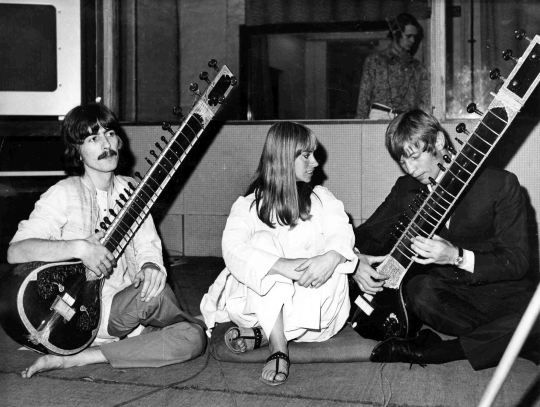
George Harrison, Rita Tushingham, and Michael York in Mumbai, January 1968; photo 2 courtesy of India Today.
“Recording in Bombay wasn’t without its challenges, however. The studios were situated at the top of an office block and recording would have to halt at 5.30 when the sound of workers clomping down the staircase rattled through the unsoundproofed building. 'If you listen closely to some of the Indian tracks,’ said George, 'you can hear taxis going by.’
Probably the most striking track on Wonderwall Music in terms of future development is 'Dream Scene.’ Opening with swathes of backwards sitar, it drifts into beautiful Indian vocals, apparently hailing from some vintage recording of playback singers. After this interlude, the track gets seriously avant-garde. Discordant piano, slowed down voices and tape loops of sound effects create a disturbing sound melange, which surprisingly presages The Beatles’ free-for-all stoned-athon 'What’s The New Mary Jane,’ recorded several months later for the 'White Album.’ George as the most way-out of the Fab Four? Here’s the proof.” - Martin O’Gorman, The British Beatles Fan Club special George tribute edition, 2011 (x)
#George Harrison#quote#quotes about George#quotes by George#Rita Tushingham#Michael York#Wonderwall Music#Wonderwall Music 55#Alexis Mardas#1968#1960s#Harrisongs#Harrison songwriting#fits queue like a glove
23 notes
·
View notes
Text
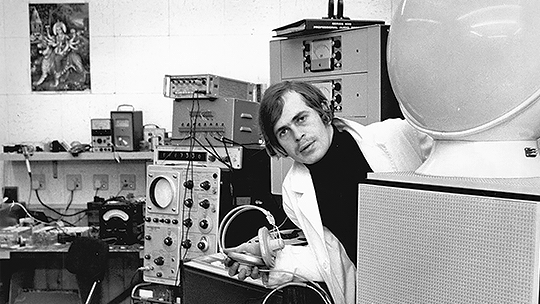


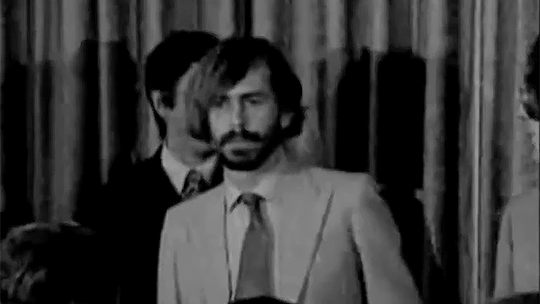

Yannis Alexis Mardas, "Magic Alex"
Bonus:
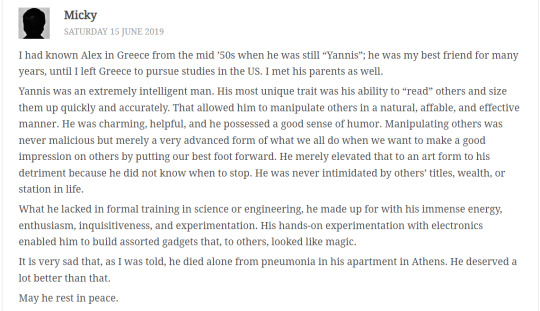
#it should have been ME! *I* should have been the greek that the beatles paid to make quirky inventions and go on holidays with them#Magic Alex#thebeatlesedit#John Lennon#Yannis Alexis Mardas#eppysgifs#Derek Taylor#this is a pro-magic alex propaganda blog#Steph#'yes he was manipulative.....but in a good way! '#he was just so advanced!#i love it#what did he do to our dear micky on beatlesbible dot com 😭#personally I love it
12 notes
·
View notes
Text
“John wanted to be with a woman. But he needed as well very, very much a friend. He needed a male friend. And my opinion is that Yoko, he managed somehow to combine both. He had a fear for pretty women running after him. Yoko was not very pretty, uh, at all, and he replaced a male in his life plus a female.”
Alexis Mardas, All You Need Is Love, Peter Brown and Steven Gaines (2024)
#I can’t stand alex (and it seems like no-one else in this book does either)#but he raises an interesting point#completely awful about yoko of course but interesting nonetheless#and basically what john said too#I wonder if alex was the one who first put that idea in his head#john lennon#john and yoko
21 notes
·
View notes
Link
0 notes
Text
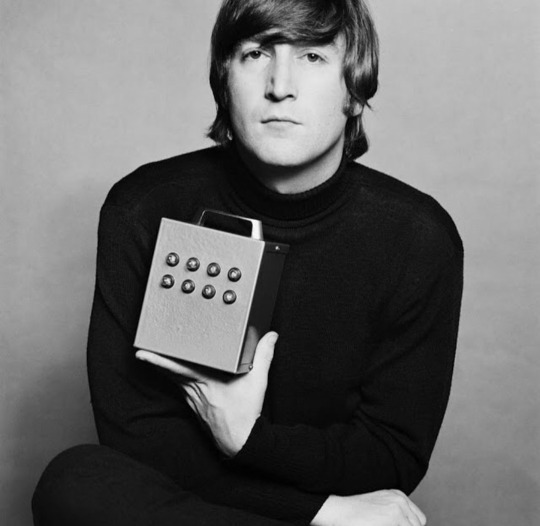
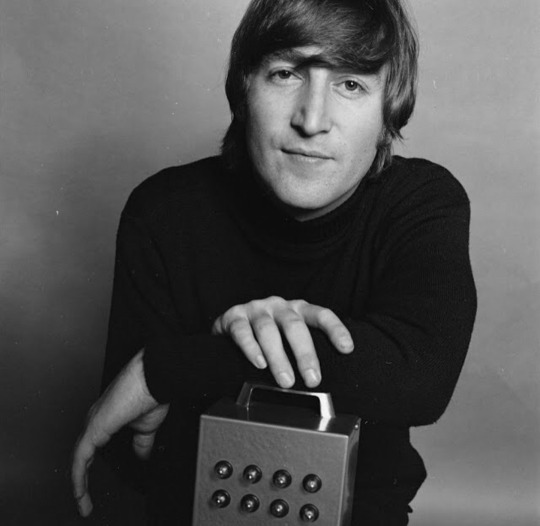

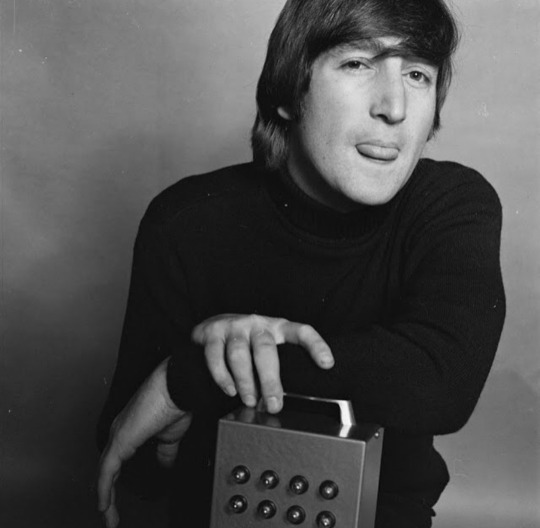
John Lennon posing with Alexis Mardas' 'Nothing Box', by Brian Duffi, 1965.
A series of images of the Beatle smiling, having just had his teeth done in the United States. While in the U.S (presumably) John purchased several “Nothing Boxes” from inventor and associate Magic Alex, one of which is featured here. These boxes did just as they promised, nothing. Other than blink, of course, until their battery runs out.
Alexis Mardas, also known as Magic Alex, was a Greek electronics engineer who is best known for his close association with the Beatles. His nickname was given to him by John Lennon when he was involved with the group between 1965 and 1969, during which time he became head of Apple Electronics.
124 notes
·
View notes